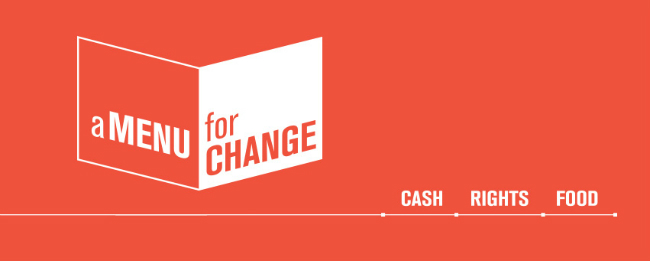Announcement to be made at Scottish Parliament reception
The three areas in which a unique project will pilot new preventative and rights-based approaches to cut the number of people turning to food banks will be announced tonight at an event at the Scottish Parliament.
The project – called ‘A Menu for Change: Cash, Rights, Food’ – is a partnership between Oxfam Scotland, Child Poverty Action Group in Scotland, Nourish Scotland and The Poverty Alliance. The four organisations have come together to help reduce the need for and reliance on emergency food aid across Scotland.
The project will work intensively with local groups in Dundee, East Ayrshire and Fife. The three areas will be named tonight at an event at the Scottish Parliament sponsored by Alex Rowley, the MSP for Mid Scotland and Fife.
The project will focus on ensuring more people access statutory and cash-based crisis support, including the Scottish Welfare Fund, as well as debt minimisation. It will also promote alternative, dignified ways of supporting those who are food insecure, such as community cafes and food cooperatives.
Anela Anwar, Oxfam Scotland Programme Manager, said: “We are really pleased to be working with local partners in these three areas but we are determined to learn lessons to inform the response to food insecurity right across Scotland.
“It is a scandal that while shops in Scotland are stuffed full with food so many people’s stomachs are empty because they can’t afford to buy food.
“A Menu for Change is working to prevent food banks from becoming a permanent part of Scotland’s social security net. Even at a time of crisis, everyone in Scotland should have the money they need to feed themselves and their families, and buy other basic essentials.”
Latest figures show a growing hunger problem in Scotland, with the number of emergency food aid packages handed out by the Trussell Trust increasing by more than 900 percent in the three years up to 2015/16. However, these figures are only the tip of the iceberg, with the true scale of household food insecurity in Scotland still unknown due to a lack of available data on people who use other crisis services or skip meals instead of going to food banks.
Mum of three Shona* turned to a food bank after her benefits were sanctioned. She said: “I felt like I’d failed. You’re supposed to be able to protect and feed your kids. Politicians sit in their big high offices and drive their big cars, but I bet you they’ve never struggled to buy bread or milk. If I had cash instead I could provide better instead of having to rely on help. Nobody should not have any money to buy food.”
Equalities Secretary Angela Constance said: “We believe that access to sufficient nutritious food is a basic human right and that no one in a nation that is as prosperous as Scotland should have to access food banks.
“A range of actions are needed to stop people having to rely on emergency food provision, including our £1 million a year Fair Food Fund and the support provided to people in crisis via the £38 million Scottish Welfare Fund. We are also continuing to address the underlying issues of food poverty.
“I’m encouraged to see this partnership coming together to help people and treat them in a dignified and respectful manner – something which the Scottish Government also places at the heart of its work.”
The three-year project was awarded nearly £1m by The Big Lottery Fund Scotland.
Alex Rowley, Scottish Labour Deputy Leader and Equalities spokesperson, said: “The people of Scotland have responded incredibly generously to help their neighbours who are struggling to put food on the table, whether volunteering or donating to a food bank.
“However the reality is food banks were never intended as a long-term solution to hunger and they should not become an entrenched part of our social safety net.
“This project offers a real opportunity to pilot alternative approaches to addressing food insecurity. All political parties should redouble our efforts to ensure everyone is treated with dignity, respect and given the support they need to tackle the underlying income crises which have resulted in a surge in food bank use in Scotland.”
